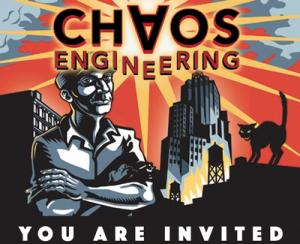Wednesday 6 December 2017, 9:00 – 17:00
KTH, Lindstedtsvägen 24, Room Fantum (direction)
Stockholm
If you’re interested in Chaos Engineering, register to the chaos-day mailing list.
The Chaos Engineering Days land in Stockholm. We’re inviting you to a free workshop on chaos engineering, DevOps and advanced software technology to be held at KTH in Stockholm.
The goal of the workshop is to create a chaos engineering community in Stockholm first, but also in Europe in general. Meeting and learning about chaos engineering, advanced Devops technology is the first step.

Practical information:
Where: KTH, Lindstedtsvägen 24, Room Fantum
When: Wednesday 6 December 2017, 9:00 – 16:00
Language of the workshop: English
Meals: lunch & coffee for registered participants, wireless included 🙂
Questions: Martin Monperrus (organizer), Sandhya Hagelin (support)
Program:
- 9:15-9:45 Workshop introduction (Martin Monperrus, KTH) Presentation of the workshop history, format and goals. Presentation of participants. Brief introduction to chaos engineering and DevOps. (workshop introduction slides)
- 9:45-10:45 Keynote: “Let it crash” (Joe Armstrong, father of Erlang) “Joe Armstrong is a co-inventor of Erlang. When at the Ericsson computer science lab in 1986, he was part of the team who designed and implemented the first version of Erlang. He has written several Erlang books including Programming Erlang Software for a Concurrent World. Joe held the first ever Erlang course and has taught Erlang to hundreds of programmers and held many lectures and keynotes describing the technology. Joe has a PhD in computer science from the Royal Institute of Technology in Stockholm, Sweden and is an expert in the construction of fault tolerant systems. Joe was the chief software architect of the project which produced the Erlang OTP system. He has worked as an entrepreneur in one of the first Erlang startups (Bluetail) and has worked for 30 years in industry and research.” (slides)
- 10:45-11:10 Coffee Break
- 11:10-11:30 “Lineages as a first-class construct for fault-tolerant distributed programming” (Philipp Haller, KTH), “For fault injection to be effective, information about lineage, or provenance, of results (data or responses) is important. The lineage of a response captures the history of events causing that response to be sent. Thus, effective testing for fault tolerance should exploit lineage information in order to perturb execution at all points that might prohibit the successful sending of an expected response. In this talk I present a new distributed programming system whose principle constructs are centered around lineages. The main goal of putting lineages at the center is a radical simplification of the way fault tolerance is implemented. Moreover, we hope to increase the effectiveness of lineage-driven fault injection for this new generation of distributed programming systems.” (slides)
- 11:30-11:50 “Configuration testing for better DevOps” (Anatoly Vasilevskiy, SINTEF) “DevOps relies on automated testing to leverage a quick feedback loop and therefore, it improves quality of a shipped product. Engineers favor high coverage of their test cases to gain confidence and foster an experimentation culture in development. Nevertheless, the test cases tend to run for one configuration of the product. We believe that we can unveil interesting properties of the product running automated testing systematically against various software configurations. In addition, it is hard to imagine that with the wide usage of multiservice architectures the product is always running in the same conditions and configurations. In this talk, we will present how we integrate the automated testing of multiple configurations into a continuous delivery pipeline, how to simulate multiple configurations using Docker technology, and how to generate various test configurations amplifying few existing configurations.” (slides)
- 12:00-13:15: Lunch (free for registered participants)
- 13:15-14:00: Parallel sessions
- Email session
- Group walk in the forest near KTH
- 14:00-14:20 “Continuous Diversification in a DevOps pipeline” (Nicolas Harrand, Univ Rennes) “DevOps supports the integration and evolution of ultra-large software systems several times per minute. This pace of software construction relies on toolchains that include state of the art software engineering principles: modular architecture, formal interfaces, explicit dependency models and automation. A major benefit of DevOps is the ability to distribute and deploy software updates, all around the globe, on a daily basis. However, high degrees of automation and reuse also come with a risk: the growth of software monocultures. We propose to push DevOps one step further, through continuous diversification. Our objective is to build massive quantities of diverse, functionally equivalent, implementations of the same system, instead of a single version massively cloned over the world. ” (slides)
- 14:20-14:40 “High Frequency Chaos Engineering” (Mats Jonsson, SAAB) “Low overhead forms of application virtualization combined with advanced programmable networks and storage open a wide range of opportunities to design and test distributed systems. We discuss how In-band Network Telemetry and distributed tracing can be put to use in a Function as a Service (FaaS) environment to do High Frequency Chaos Engineering at the rate of millions of virtual instances per second.” (slides)
- 14:40-15:00 “Correctness Attraction: Runtime Perturbation for Full Correctness” (B. Danglot, Inria) “Can the execution of a software be perturbed without breaking the correctness of the output? We devise a novel protocol to answer this rarely investigated question. In an experimental study, we observe that many perturbations do not break the correctness in ten subject programs. We call this phenomenon “correctness attraction”. The uniqueness of this protocol is that it considers a systematic exploration of the perturbation space as well as perfect oracles to determine the correctness of the output. ” (slides)
- 15:00-15:30 Coffee break
- 15:30-16:15 Breakout Group Discussion
- 16:15-16:30 Presentation of group results
- 16:30-16:45 Closing
Topics:
- Chaos engineering principles and tools
- Chaos monkey, monkey testing in the field
- DevOps tools and approaches
- Site reliability engineering
- Software antifragility
- Production support for monitoring / diagnosing / repairing distributed systems
- Chaos & cloud elasticity / scalability
- Continuous integration, testing and deployment*
Previous edition: Chaos Engineering & DevOps Meetup @KTH Stockholm, Dec 6 2017